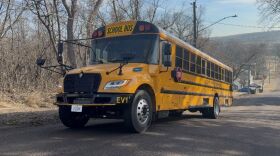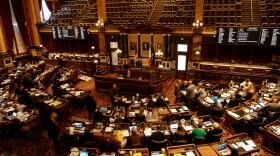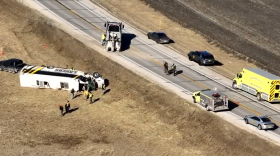-
The Color the Wind Kite Festival in Clear Lake takes place on the lake's frozen surface, which has thinned near the shore due to unseasonably warm weather. The unsafe ice conditions have caused the event organizers to cancel this year’s festival.
-
As a federal program that helps school districts buy electric buses is under review, one of Iowa’s largest school systems is putting new EV buses on the road this week.
-
The U.S. House voted to repeal President Trump’s tariffs on Canada without support from Iowa's four Republican representatives. Canada is one of the largest agricultural trade partners with the U.S. and is a top export market for tractors and farm equipment made in Iowa.
-
The Iowa Senate passed a bill that would change Iowa's foster care training requirements. Under the proposal, the state would determine a training course for each prospective foster parent, with some areas of training still required.
-
Listen as Morning Edition Host Meghan McKinney and IPR's Katarina Sostaric review the latest in Iowa politics.
-
In the year since Iowa lawmakers repealed state civil rights based on gender identity, transgender and nonbinary Iowans have experienced fear, anxiety and uncertainty. The historic legislation has forced transgender Iowans to contemplate their future in the state. Some have left, and others are navigating how to continue living in the state.
-
An Iowa Lakes Community College baseball player was killed and 32 other people were injured when the team’s bus overturned Wednesday in northwest Iowa. College leaders pledge to support students through this time.
-
An Iowa House subcommittee advanced a proposal Thursday to restrict minors from accessing materials with sexual content in public libraries unless they have parental consent.
-
A bill that would make several changes to public assistance programs advanced through an Iowa House subcommittee Wednesday over the objections of people who said it would result in more babies going hungry.
-
The Ames City Council passed an ordinance Tuesday prohibiting discrimination in employment, housing and education based on an individual’s gender identity. It comes about a year after the state removed gender identity from the Iowa Civil Rights Act, which sparked some cities to adopt resolutions affirming local protections.
Play Live Radio
Next Up:
0:00
0:00
Available On Air Stations










